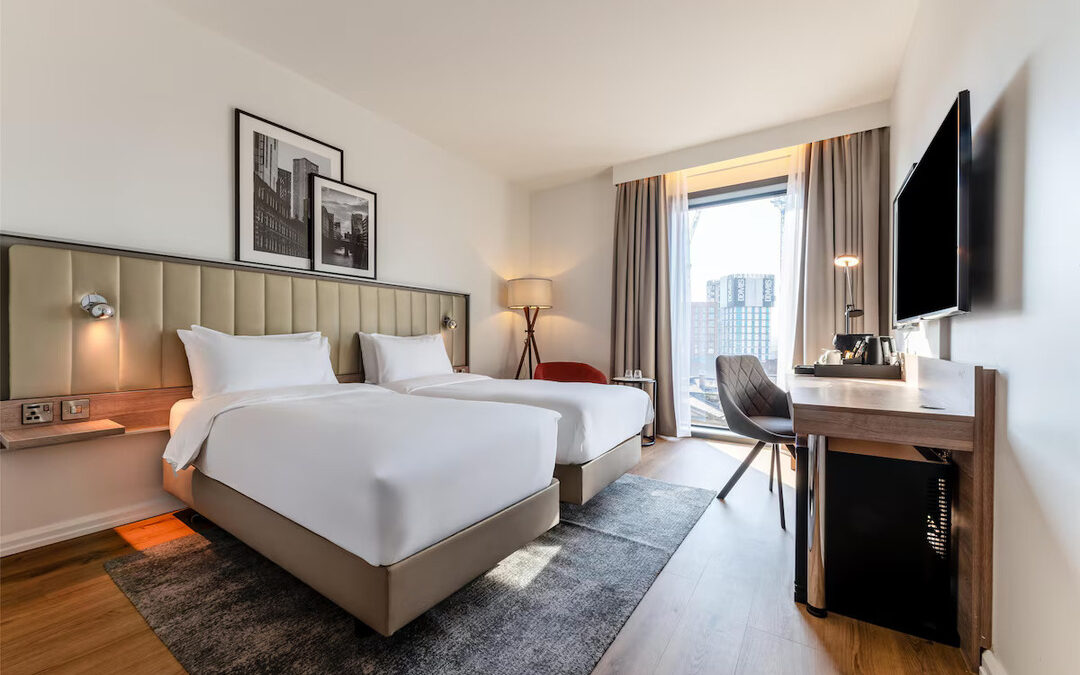Radisson Group Launches 1st Verified Net Zero Hotels in Oslo and Manchester
Radisson Hotel Group unveils its first fully verified net zero hotels in Oslo and Manchester, setting a new sustainability benchmark.
Radisson Hotel Group has launched its first two Verified Net Zero hotels, with renovated properties in Manchester, UK, and Oslo, Norway, meeting the Net Zero Methodology for Hotels—a standard verified by independent auditor TÜV Rheinland.
The company says the two hotels meet the carbon neutrality standards expected for 2040, 15 years ahead of Radisson’s stated target to achieve Net Zero across all operations by 2050.
Renovated Properties Lead the Charge
The Park Inn by Radisson Manchester City Centre has been rebranded and relaunched as the Radisson Hotel Manchester City Centre, A Verified Net Zero Hotel, and opened to guests on May 19.
In Oslo, the Park Inn by Radisson Oslo City Centre is being transformed into the Radisson RED Oslo City Centre, A Verified Net Zero Hotel, scheduled to open in July 2025.
The moves are part of Radisson’s strategy to demonstrate that existing hotels, not just newly built ones, can be successfully converted into certified net-zero properties.
“Eighty percent of the buildings that need to become Net Zero by 2050 are already built,” said Federico J. González, executive vice chairman of Radisson Hotel Group. “We are demonstrating that Net Zero conversion hotels are possible.”
Eliminating Carbon Across Scopes 1, 2 and 3
Radisson’s Verified Net Zero program addresses emissions across all three scopes of the Greenhouse Gas Protocol:
- Scope 1 & 2: Achieved through electrification of hotel functions such as heating, hot water, and cooking, along with the purchase of 100 percent renewable energy.
- Scope 3: Focused on operational and supply chain emissions, including restructured food & beverage sourcing, waste minimization and transport-related reductions.
Residual emissions are removed via Nature-Based Solutions, primarily through carbon credits from Agreena, Europe’s largest soil carbon program, which supports over 2,300 farmers regenerating more than 4.5 million hectares of farmland.
Sustainability in Action: Guest Experience
Guests at the Net Zero properties will experience sustainability without sacrificing comfort, the group said. Key features include:
- 100% Renewable Energy: The Manchester hotel utilizes heat pumps and induction kitchens, eliminating the need for gas. Oslo’s district heating is powered by renewable energy from city waste and data centers.
- Low-Carbon Menus: In partnership with Swedish firm Klimato, menus are redesigned with carbon footprint labels (A to E rating) and seasonal ingredients to cut emissions by up to 40 percent.
- Minimal Waste Operations: Initiatives include eSmiley food waste software, community redistribution via Too Good To Go, recycling bins in all rooms, bulk bathroom amenities, and the Stay E-concierge app to reduce paper use.
“With these hotels, we’re reshaping the future of hospitality,” said Inge Huijbrechts, chief sustainability & security officer. “We’ve taken meaningful steps to reduce emissions from energy, operations and the supply chain — and we’re just getting started.”
The group plans to roll out additional Verified Net Zero conversions in the years ahead as part of its 2050 roadmap.
Nirmal Menon
Related posts
Subscribe
Error: Contact form not found.


